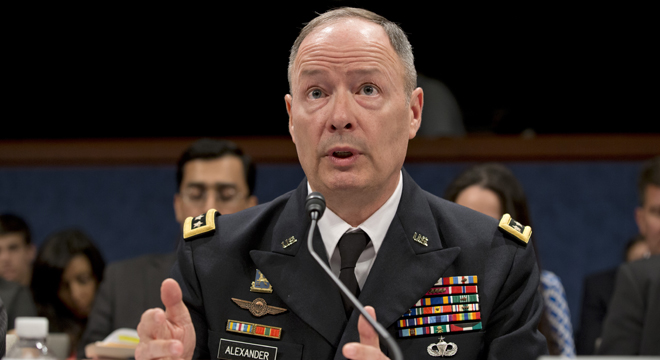WASHINGTON (AP) — The head of the National Security Agency sidestepped questions Thursday from a senator about whether the NSA has ever used Americans cellphone signals to collect information on their whereabouts that would allow tracking of the movements of individual callers.
Asked twice by Sen. Ron Wyden, D-Ore., if NSA had ever collected or made plans to collect such data, NSA chief Gen. Keith Alexander answered both times by reading from a letter provided to senators who had asked the same question last summer. He also cited a classified version of the letter that was sent to senators and said, “What I don’t want to do … is put out in an unclassified forum anything that’s classified.”
Wyden promised to keep asking.
“I believe this is something the American people have a right to know, whether NSA has ever collected or made plans to collect cell site information,” Wyden said.
The testy exchange at a Senate Intelligence Committee hearing illustrates the wider tension that has grown between the public and the U.S. intelligence community, following disclosures by Edward Snowden, a 29-year-old former systems analyst on contract to the NSA, about the extensive NSA collection of telephone and email records of millions of Americans.
The panel’s bipartisan leadership used the hearing to promote their version of legislation to change the Federal Intelligence Surveillance Act. The lawmakers seek to trim NSA’s authority to access and analyze U.S. phone records and provide new protections to Americans’ privacy. They also want to broaden the government’s spying powers to allow monitoring of terror suspects who travel to the U.S. after being tracked overseas by the NSA.
Sen. Dianne Feinstein, D-Calif., chairwoman of the committee, said the legislation would “strictly limit access to the … phone metadata records, expressly prohibit the collection of the content of phone calls,” and limit the amount of time such U.S. phone call data could be kept.
Such records show the date and length of calls, and the numbers dialed.
But Feinstein’s proposed legislation would not stop the bulk collection of telephone and email records. A separate bipartisan group of four senators, including Wyden, unveiled legislation earlier this week to end those bulk collections.
Feinstein and the committee’s top Republican, Sen. Saxby Chambliss of Georgia, defended U.S. intelligence efforts, as did Alexander and Director of National Intelligence James Clapper — insisting that while they collect U.S. bulk records, they do not listen in on individual Americans’ phone calls or read their emails without a court order.
Alexander and Clapper spoke of wanting to cooperate with suggested changes in order to win back the public’s trust.
Clapper told the committee he was willing to consider limiting both how U.S. telephone and email data collected by NSA is used, and the amount of time it is stored. He said he’s also open to other changes, such as appointing an independent official to oppose the government in hearings before the FISA court, the secret federal court that considers all government surveillance requests.
But Alexander’s exchanges with Wyden and Sen. Mark Udall, D-Colo., showed the tension between the intelligence community and a bipartisan group of lawmakers who think NSA’s powers need to be drastically cut.
“Is it the goal of the NSA to collect the phone records of all Americans?” Udall asked.
“Yes, I believe it is in the nation’s best interest to put all the phone records into a lockbox that we could search when the nation needs to do it. Yes,” Alexander replied.
But Alexander said the cellphone site data — it shows the whereabouts of cellphone callers, and enables an analyst to track where they go — is different.
“The court has said hold off if you want to do cell-site data or plan to do that, you have to come back to the court,” Alexander said. “Did I answer those right?”
Alexander’s reply was an apparent reference to Wyden’s much-publicized exchange with Clapper earlier this year over whether U.S. intelligence agencies had gathered the telephone records of millions of Americans.
Clapper said no, but then had to apologize later when Snowden’s leaks revealed the bulk collection of U.S. telephone records and email data.
___
Follow Dozier on Twitter at http://twitter.com/kimberlydozier
Copyright 2013 The Associated Press. All rights reserved. This material may not be published, broadcast, rewritten or redistributed.






